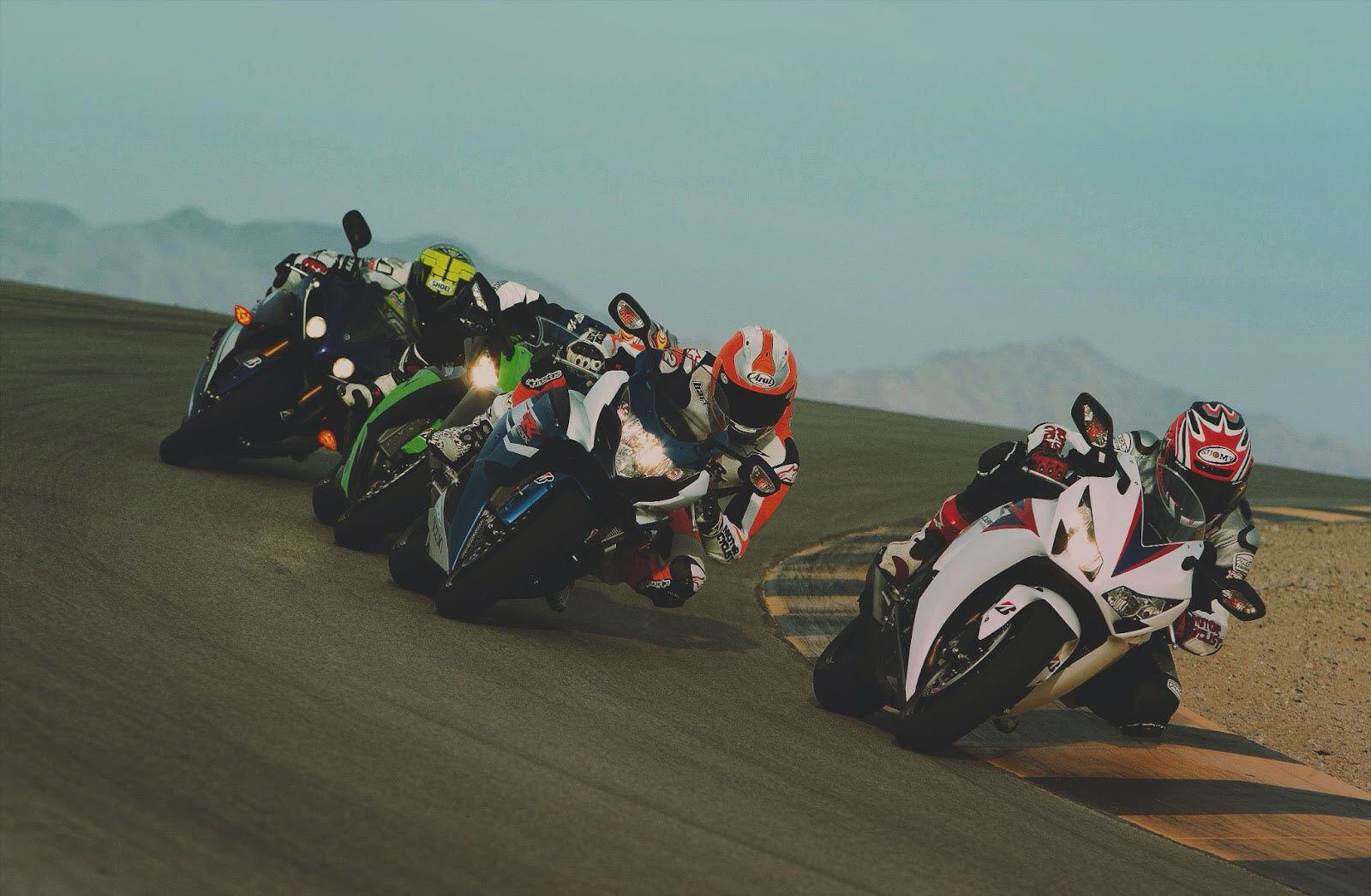
Motorcycles tell stories. We absorb an abundance of information with just a glance. The details of its shape, function, and personality reflect light into our photoreceptors, as our own perceptive filters—made up with all we’ve learned and experienced—spin a tale in our mind.
Whether it’s a sheepskin-covered seat, with a tattered Tibetan prayer flag strung between the handlebars, covered in earth (and stickers), with a spare tire cinched down over the belongings of what appears to be a well-trodden steed, or a beast of a different kind altogether. Perhaps a sleek, shiny, two-wheeled rocket, nothing aboard to hamper aerodynamics, simply a vision of what an old friend of mine deems “stupid fast.”
These are two conceptions of motorcycles with very different stories.

I find myself tasting such diverse narratives of motorcycles when I abruptly arrive within the depths of Los Angeles, hanging around motorcycle racers, after spending months on end in the middle of what many may deem as “nowhere,” navigating my way through the Andes, the Amazon jungle, the mule-cart-filled, machete-toting gauchos of the central plazas, and shooing capuchin monkeys away from discarding the entire contents of my motorcycle luggage on the ground.
Self-reflection becomes a habitual state of mind when you spend as much time alone in your helmet as I do. The pits were no different. There I was, walking amid the suited-up racers, meandering through the labyrinth of individual tents sheltering each racer’s sacred paraphernalia, as I started to ponder the finite and infinite games of motorcycling.
Related: The Risks, And Rewards, Of Riding Motorcycles


Some Background
You may well know the highly influential book by James Carse, Finite and Infinite Games. The book description reveals finite games as “the familiar contests of everyday life, the games we play in business and politics, in the bedroom and on the battlefield—games with winners and losers, a beginning and an end.” The finite game is one played with the goal of winning.
Infinite games are those that are unscripted, rules are undefined, and the goal of the game is to continue playing.
These two types of games make up the strategies of our lives, not so much as the types of games we choose, as finite games always exist within the infinite game, but rather the mindset of the player while they are playing. The crucial dichotomy exists between those who play finite games for recognition, ranking, and awards and those who play infinite games for the sheer joy of the enduring challenge itself.

Paradoxical Bikers
These racers, especially of the hooligan variety who I’ve spent time with, are pushing themselves to their absolute limits. They often knock into one another, getting into wrecks that have tremendous consequences. This is a very finite game, with an experienced racer seeking to win before they even begin. They train to know every move they’re going to make, burning it into muscle memory before the starting gun. The game itself is more of a demonstration of what the player has already figured out.
By contrast, because I’m alone, and usually quite far away from any hospital—especially one that is sterilized—I’m trying to be as safe as I can, which is relative based on the inherent riskiness of riding a motorcycle abroad. Getting injured would really mess up my journey. Wrecking my bike would leave me stranded somewhere, likely for a good chunk of time, and may even be the end of this lifestyle I’m quite fond of. Therefore, I’m doing my best to play the long game.
The racers and I both have lives which revolve around motorcycles, but in a manner that is strikingly dissimilar. Does that mean we’re playing different games?

It’s All in the Mind
The mentality of finite players is to beat everyone around them whereas infinite players play to be better than themselves each day, each moment. Maybe we’ve met racers who are in the infinite game. They are content no matter what place they come in, as long as they know they did their best and they see improvements within their own skill, their own game.
We’ve likely also met finite players on long-distance motorcycle trips. Those who are checking boxes by simply passing through a city, a country, or linking a route, such as finishing the journey from Alaska to Ushuaia, Argentina. The finite players may not feel content at the end of their journey; they feel empty and without purpose. The urge to compare themselves to others who have made the same journey arises, which is almost guaranteed to bring about personal suffering. Joy and fulfillment does not come from comparison, but rather from your own personal advancement.

Game Over
The winnings gained in an infinite game is simply the pleasure of being in it. Your game strategy is often defined and altered day by day, with the goal of longevity. The infinite game mentality is that of the horizon. You never reach the end—there’s always further to go, and the only competitor is yourself. The more time you have to play, the more free you are.
I suppose that one of the quandaries of the “infinite” game is in the name. As I’m sure you’ve already considered, our life spans here on this planet are not infinite (spoiler alert!). This game, regardless of your mentality, does come to an end, which makes the game itself more precious.

To Infinity and Beyond
How do we live with an overarching infinite game mentality, on and off the bike, despite the awareness of our own demise? Adapted from Simon Sinek’s book, The Infinite Game, in the context of motorcycles, here are five tips to help the infinite player make value-based moves.
- Commit to something bigger than yourself. Identify and focus on your values and mission and develop a strategy that is consistent with that.
- Cultivate vulnerability and empathy as you accept the fact that in the long game, some players will perform better than you at certain points in time.
- Continue to execute your plans and improve your skills.
- Understand that change is inevitable and work to adapt.
- Embrace play and look for win-win situations.
You alone get to choose how you play the game of life, as well as the sub-games within it.

It is pretty easy to throttle past the notion of committing to something bigger than ourselves, casually throwing it in before four other steps, when in reality, it is a pretty big deal (think: mahogany and leather-bound books, etc). What does that mean? How do we find the thing to commit ourselves to? Unfortunately, those aren’t easily answered questions, as the answers corner around aspects of our own life’s meaning and our purpose here. A cause bigger than yourself could look inclusive, being in service of others, dedicating yourself to a just mission, or inhabiting your own integrity and resiliency and helping others do the same. Find an idea that you can’t be talked out of.
“How” we achieve our goals is the strategy, whereas the “why” is the driving force behind it, the fuel.
Let the “why” be your fuel.
So while not every game we play in life is endless, such as life itself, we retain the power to choose what type of mindset we exist within while playing. We control the narrative. We can choose to be better versions of ourselves every day, to help others do the same, and to advance a cause greater than ourselves. It doesn’t matter if you’re a motorcycle racer pushing your limits on the track, or a long-distance solo traveler going wherever the wind takes you, the first step is in knowing which game you’re playing, and why. It is essential that you know whether you’re making a decision, problem solving, or taking action in the short term, win-lose finite game, or in the long term, enduring infinite game. Thinking in context of these two types of games can help you achieve your goals, in the long and short run.
If the game is keeping the spirit of riding alive, the stories of all motorcycles and their riders can be told through the lens of the infinite game, of encouraging and supporting one another regardless of whether we’re aiming for the finish line or heading out toward the endless horizon.

Source: MotorCyclistOnline.com
